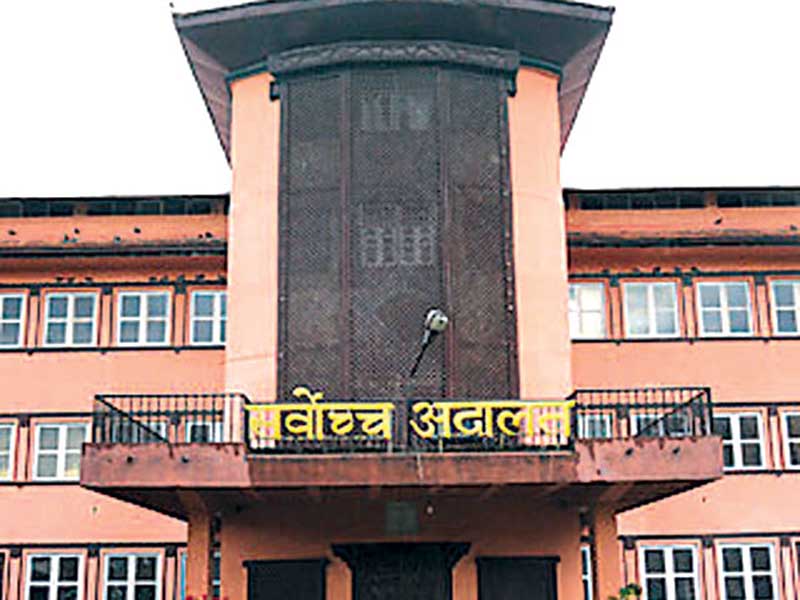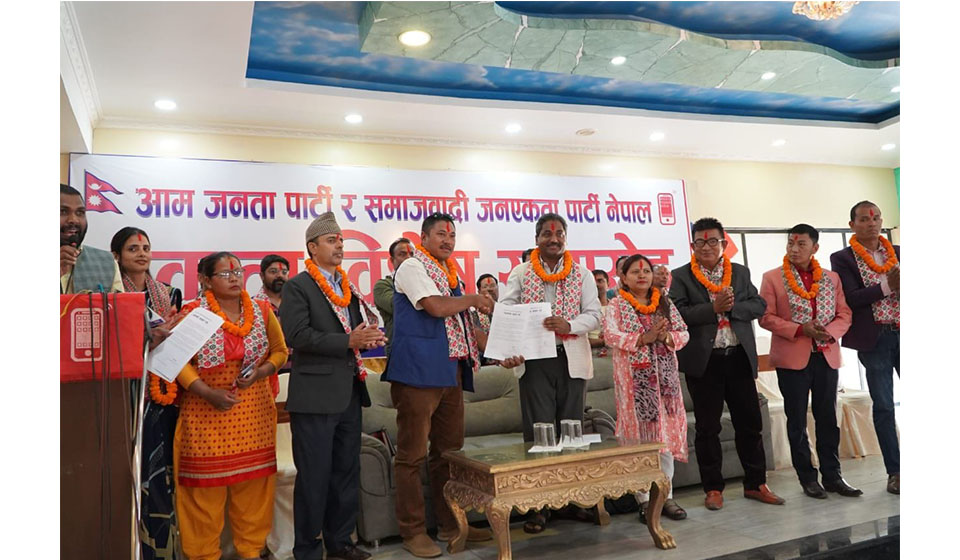
OR
Labor Act applicable even to employees of banks and financial institutions: SC
Published On: September 3, 2023 03:15 PM NPT By: Bhasa Sharma

KATHMANDU, Sept 3: The Supreme Court (SC) has ruled that no organization can terminate an employee without proper cause and doing so would be against the law. The joint bench comprising Justices Ananda Mohan Bhattarai and Hari Prasad Phuyal has clarified that the Labor Act applies to employees of banks and financial institutions as well. The bench also explained that the punishment should be based on the misconduct of the worker. According to the judgment of the bench, the case of employees working in banks and financial institutions can be heard by the labor court.
The banks have claimed that labor laws are not applied as banks and financial institutions have their own regulations. But the SC has made it clear that any worker working in the banking or financial sector has the right to go to court. "It is not legally justifiable to argue that labor law does not apply to the banking and financial sector, which guarantees the labor rights of every worker,” the bench ruled.
Prime Commercial Bank sacked Anjana Dhakal, who was working in a junior position in Balaju branch, for making a mistake during the transaction. She had transferred an amount to a customer's account at the request of the debtor customer, leading to her dismissal based on the bank's staff service regulations.
Dhakal said that she had helped in a humanitarian way with the permission of the client. Dhakal said that a client's son was studying in America and the money was transferred with the mother's consent. The bank dismissed her on September 20, 2017 saying that the work was against the regulations and asked her for an explanation. The executive officer of the bank approved the decision made by the board of directors to dismiss Dhakal from service. Challenging the bank's decision, Dhakal filed a case in the Labor Court.
The Labor Court ordered Dhakal to be reinstated and removed from service on June 7, 2018. Dissatisfied with the decision of the Labor Court, the bank filed an appeal in the Supreme Court with the Labor Court, Labor and Employment Office and Dhakal as defendants. Then the SC upheld the decision of the Labor Court. The full text of the judgment passed by the SC on July 3, 2023 was published recently.
The SC's judgment emphasizes that the state must ensure that bank employees have access to appropriate and effective legislative, administrative, judicial, financial, and other remedies. The SC has also pointed out that the International Labor Organization and human rights treaties outline the rights of workers.
The judgment highlights that these international treaties specify that workers have the right to appeal to an impartial body, such as a court, tribunal, arbitration committee, or arbitrator, as labor-related rights are fundamental to a worker's employment.
It is mentioned in the verdict that no establishment shall be given special treatment as per the labor law and jurisprudence established in the comparative jurisdiction. According to the SC, it is wrong to say that labor tribunals, courts or arbitration committees do not have appellate jurisdiction over the dismissal of employees. Section 165 (2) and (4) of the Labor Act, 2074 BS, established to uphold the right to labor as stated in Article 34 of the Constitution, clearly states that workers can appeal to the Labor Court regarding employment terminations.
There is a provision that employees of banks established as public institutions and owned 50 percent or more by the Government of Nepal can appeal to a specialized administrative court. "When the labor court assumes appellate jurisdiction concerning bank employees in the private sector, it does not threaten the banking sector's existence," explained the SC. The SC has said that the Labor Court, which is a competent, impartial and independent judiciary established in accordance with the provisions of the Constitution, makes judgments while considering the sensitivities of the banking sector.
The SC explained that the commitment made by the Constitution regarding egalitarian society and socialism is meaningless if any establishment, ignoring the issue of workers' rights and interests, tries to exclude them from the effect of labor law on the basis of nature.
The Labor Act, 2074 BS, does not exempt any sector or establishment from labor laws. The judgment also stresses that punishment for a crime should be proportionate to the seriousness of the offense. In this context, the SC's verdict reads, "If an employee misbehaves, the punishment should be determined based on the seriousness of the misconduct. The grounds and rationale for such punishment should be disclosed."
It is mentioned that the offense committed by the respondent Dhakal and the punishment was not proportional and the petitioner bank did not have any real impact due to the disputed transaction. "It is not seen that there was any malicious motive and the first and only bad conduct that occurred after entering the service of the bank since 2011 was the subject of the disputed transaction," the SC said. It was not seen that proportionality could be considered in the amount of bad conduct and punishment while taking action,” the SC said, “The decision made by the Chief Executive Officer on May 21, 2017 to dismiss Dhakal from employment and to reassign her to service did not seem to be necessary to say otherwise to the decision of the Labor Court on June 7, 2018.”
The SC found that the misconduct by the petitioner, Dhakal, and the punishment imposed on her were disproportionate. Moreover, the bank did not suffer any significant harm due to the disputed transaction. The SC noted, "It is not seen that there was any malicious motive and the only misconduct that occurred since Dhakal's employment with the bank in 2011 was related to the disputed transaction." The SC concluded that there was no basis to consider proportionality in the punishment for this misconduct, and the decisions of the Chief Executive Officer to terminate Dhakal’s employment on May 21, 2017, and her subsequent reinstatement as ordered by the Labor Court on June 7, 2018, were deemed justified.”
You May Like This

Ansari's appointment challenged at Supreme Court
KATHMANDU, March 25: A writ petition was filed at the Supreme Court on Sunday challenging the recent appointment of Samim... Read More...

I performed my duties with professional integrity: Outgoing CJ
KATHMANDU, Jan 2: Outgoing Chief Justice Om Prakash Mishra said on Tuesday that he performed his judicial tasks during his career... Read More...

Court paves way for admissions under IOM
KATHMANDU, Oct 10: The Supreme Court on Tuesday paved the way for the admission of students to various medical science... Read More...
Just In
- Sunkoshi-Marin Diversion Project’s tunnel construction nears completion, breakthrough scheduled for May 8
- Govt tightens security arrangement for Third Investment Summit 2024
- Pesticide residue found in vegetables in Nepalgunj
- Aam Janata Party and Samajwadi Jana Ekata Party merge
- 1,600 participants confirmed for Nepal Investment Summit
- Ilam-2 by-elections held peacefully, vote count likely to start tonight
- NEA schedules five-day power cut across Kathmandu Valley for underground cable installation
- Hundreds of passengers including foreign tourists in distress as poor visibility halts flights to and from PRIA








-1200x560-wm_20240427144118.jpg)







Leave A Comment